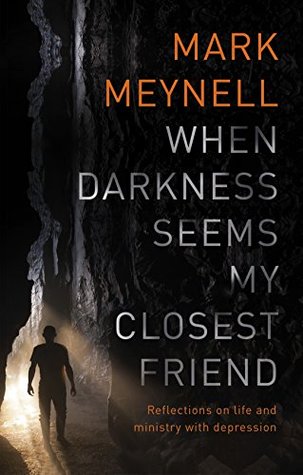More on this book
Kindle Notes & Highlights
by
Mark Meynell
Read between
November 5, 2018 - February 21, 2019
As one good friend remarked to me, ‘fine’ can actually serve as an acronym, standing for ‘Feelings Inside Not Expressed!’. It is an understandable mask, and if we never made use of it, we would probably never escape those after-church conversations that already seem interminable enough.
I’ve read various Christian books too, but (to generalize!) these tend only to irritate. I am being unfair, I realize, but they are often too simplistic, too glib or too prescriptive, and sometimes all three. They seem to betray the fear that the slightest hint of mystery or doubt might somehow undermine God and his gospel (which is absurd).
Depressive illness generates a gnawing fear that can make one cower at the sound of approaching footsteps. It is a curse that makes one withdraw in self-defence. Its endgame is solitary confinement, deceiving us into the thought that we are better off alone. That is, of course, nonsense. We desperately need other people . . . especially amid the darkness. We may also long for it. But what we crave, we dread. We are thus ensnared in the hell of depression’s cave.
Grace is counter-intuitive, illogical, overwhelming. Thank God.
It is strangely comforting, therefore, that Bunyan puts this moment near the start of The Pilgrim’s Progress, long before Christian and Hopeful find themselves in Giant Despair’s castle. That shows great pastoral wisdom as well as theological insight.
In contrast to guilt, which provokes a fear of the discovery of what I have done, shame generates a fear of the discovery of who I am.
She remarked on the relief of hearing from someone in the midst of, rather than having won, a personal battle. It is obviously encouraging to hear testimonies of people who have survived terrible challenges or illness and come out stronger or restored. That gives hope to others with similar trials. But it is not so helpful if our ‘testimony diet’ is exclusively a string of victories and miraculous interventions.
For, then, those enduring chronic pain or difficulty will invariably feel worse. They need help for those times when there is no change. How does one persevere then?
in the vast majority of circumstances, suffering cannot be inherently good. So mental illness cannot be a good thing. It is one of many tragic features of a fallen creation that can only groan until it is redeemed and restored. I wouldn’t wish it on my worst enemy. There is an irrationality to it – as there nearly always is with evil – an absurd pointlessness to its corrosive, energy-sapping pain. More than that, suffering far exceeds the capacities of human understanding. We simply cannot know what it is all about.
In contrast to the way many naturally think, God rarely grants a gift for the benefit of its recipient. That is a classically Western mistake because it is shaped by our obsessive individualism.
as Paul wrote to the Corinthians in his famous section on spiritual gifts, ‘to each one the manifestation of the Spirit is given for the common good’ (1 Corinthians 12:7). In other words, in the Christian family, each of us is given gifts in order to serve others. This is why Paul launches into that sublimely challenging, but oft misunderstood, reflection on how love works in the very next chapter (1 Corinthians 13). The gifts we each have are designed to help us love others in our own unique way.


